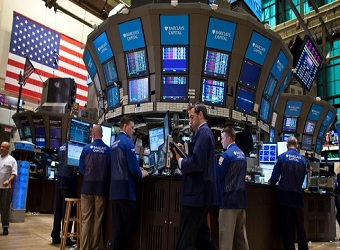U.S. equities traded lower on Tuesday, pulling back from record highs, as oil prices dropped to their lowest levels since November.
The S&P 500 lagged, falling 0.42 percent as the energy sector dropped nearly 1.1 percent to lead decliners. The Dow Jones industrial average hit a record before slipping 10 points, with Chevron and Disney contributing the most losses. The Nasdaq composite declined 0.5 percent.
U.S. crude for July delivery fell 2 percent to $43.31 a barrel amid signs of rising production. Crude also entered a bear market, trading at least 20 percent below its 52-week high.
“$44 was a big area for crude,” said JJ Kinahan, chief market strategist at TD Ameritrade. “Right now, it’s having an impact on stocks but it could be bigger. The next major area of support is around $40.”
Oil prices are “most definitely” heading to $40 a barrel and will likely dip into the upper $30s, John Kilduff, founding partner at energy hedge fund Again Capital, told CNBC’s “Squawk Box.”
“Not only do we have a struggle with production and an ineffectual OPEC, non-OPEC production regime, but you have this overhang again that is not clearing, and so that is what this market is reacting to,” he said.
investors also kept an eye on Washington as they digested remarks from House Speaker Paul Ryan on tax reform. He said the government is cutting back on regulatory red tape and that changes to the tax code must be permanent. Ryan later spoke with CNBC’s “Power Lunch,” saying the U.S. can’t hit 3 percent growth with tax reform.
“I think Ryan is trying to right the ship here,” said Adrian Day, CEO of Adrian Day Asset Management. “The market has become a bit synical about whether these measures will come into law.”
The prospects of tax reform were key in the stock market’s postelection run higher, but the Trump administration and the GOP-led Congress have not yet given concrete details on what their joint plan will be.
Treasury Secretary Steven Mnuchin told CNBC earlier on Tuesday he is confident that “massive tax reform” will be passed this year. “We’re 100 percent committed to getting it done this year. It’s critical to the economy,” he said on “Squawk Box.”
“If tax reform gets done, that’s going to be a big bullish catalyst for the stock market,” said Adam Sarhan, CEO of 50 Park Investments. He noted, however, Wall Street is still uncertain about whether these plans will come to fruition anytime soon.
Stocks were coming off a banner day Tuesday, as the Dow and S&P notched intraday and closing records. The tech-heavy Nasdaq, meanwhile, posted its best day since Nov. 7.
“Yesterday was a pivotal day on Wall Street because the bulls showed up and they bought the dip,” said 50 Park’s Sarhan. “That tells you the underlying strength from the past few years is still there.”
In economic new, there were no major data releases, but investors digested remarks from key Federal Reserve officials.
Boston Fed President Eric Rosengren said the current low-rate environment was likely to remain for some time, adding that low rates handicap the central bank’s ability to “offset negative shocks.”
Meanwhile, Fed Vice Chair Stanley Fischer said that while the U.S. and other nations have taken actions to strengthen their housing finance systems, more needs to be done to prevent a future crisis.
Dallas Fed President Robert Kaplan is scheduled to speak after the close Tuesday.
Treasury yields traded lower, with the benchmark 10-year yield slipping to 2.15 percent and the two-year yield holding near 1.35 percent.
In corporate news, biopharmaceutical firm Parexel announced it will be acquired by Pamplona Capital Management for $4.6 billion, or $88.10 a share. This is the latest M&A deal unveiled in less than a week.
On Monday, EQT announced an agreement to buy Rice Energy for $6.7 billion and Amazon said Friday it’s buying Whole Foods for $13.7 billion.
Bill Casey, vice chair for transaction advisory services at EY Americas, said last week the second half of the year could experience more M&A activity, citing data from a survey conducted by the company. “We’re seeing 79 percent of the respondents saying they expect to make a deal in the next 12 months, which is kind of unprecedented,” he said.
“The dealmaking market has shown resiliency,” Casey added. “When you think about all the things that have happened, … the fundamentals continue to move it forward.”
Source: CNBC


